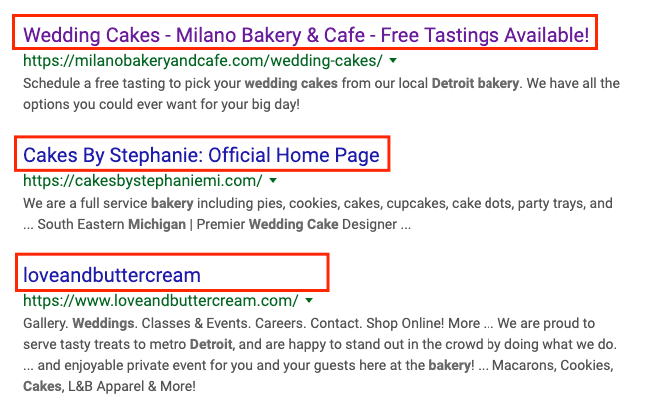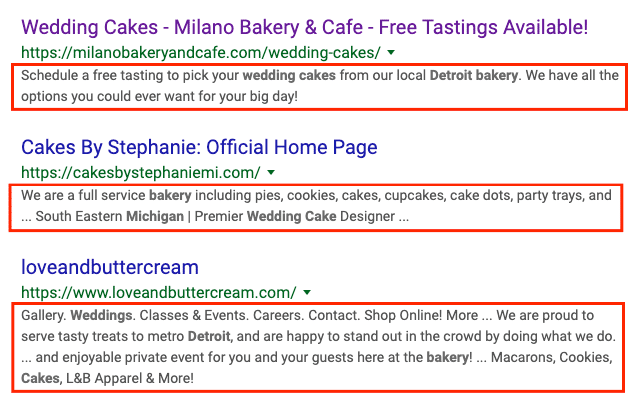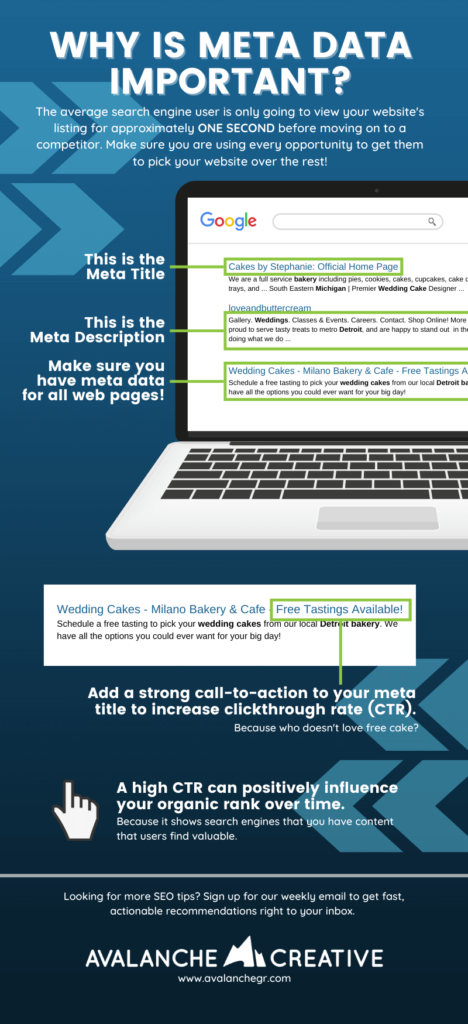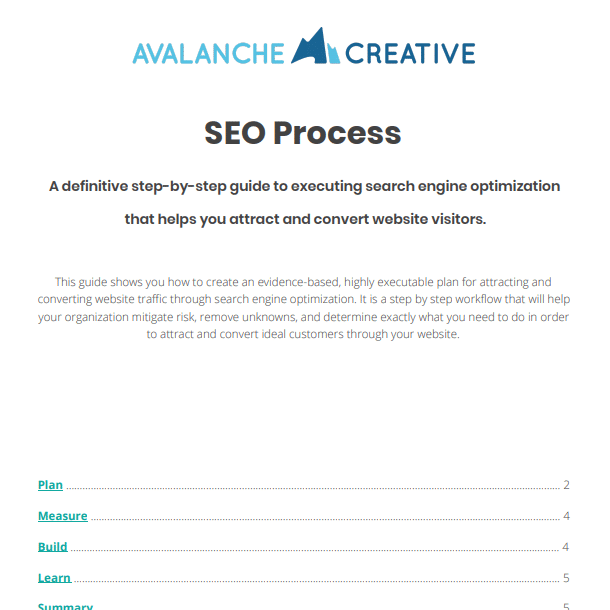How Optimizing Your Meta Title Can Increase Clicks & Conversions
Category: SEO Fundamentals | Tags:
What is a meta title?
The meta title, also known as a page title or title tag, is the name of your individual web page. It is stored in the head data of the document, so it doesn’t appear on the web page by default. It can only appear once per page. Optimizing your meta titles is a crucial part of SEO.
Why is a meta title important?
The average search engine user is only going to give your website approximately 1 SECOND before they move on to a new site. Your meta title (and description for that matter, but more on that later) can make sure your ideal customer clicks on your link in the search engine results as opposed to your competition.
Even more than that, a really strong title can give the searcher a reason to stay on your site and even convert (call, fill out a form, buy, etc.).
How search engines use meta titles
The meta title is what shows up on the search engine results page of search engines. That’s the page you see whenever you search something on a search engine like Google.
You can control what your meta title says (and you should).
Let’s use a simple example.
Pretend you search the term wedding cake vendor near me.
Take a look at the screenshot below. Which title do you feel is best optimized? Which title is more compelling to the searcher? (the meta title is in the red boxes).

I don’t know about you, but, the first one stands out among the rest because it has a clear, compelling call to action.
Who doesn’t love free cake tasting!?
Even before the searcher has clicked through to any of these pages, they get a glimpse into what makes Milano Bakery better than their competition.
Your meta title offers a place to “pre-sell” before the searcher has made it to your website. Like the example above, you can provide the searcher with a reason to click and then stay on the page and read more about your product or service. They’ll stay longer if you have a strong, clear, and simple offer to go along with your page.
Strong meta titles that have room for a relevant call to action can increase clicks from the search engine results page to your website. Not only that but optimized meta titles can help your ideal customer in their decision-making process. In our example, after the searcher has gathered all relevant information about wedding cakes they know the next step is clear; request a free cake tasting. In this example, the bar is set right away. Other wedding cake vendors had better offer a free tasting or they won’t make the shortlist.
The searcher may spend some time browsing other options before responding to your call to action, but if they read it within the few precious seconds that they are on the search engine results page, they may associate your brand with a great call to action, which can be hard to forget.
Click-through rate (CTR), or the frequency in which your page gets clicked as opposed to your competition, can even influence your rank over time and a great meta title can increase your CTR.
Google wants to provide the best result to the user and they want to match the users intent. If one page in the search engine results page is receiving a lot more click-throughs and lower bounce rates than others that show up for the same keyword Google is going to view that result (page) as the best option for that search term.
Page titles have a huge effect on your SEO. They have the ability to make or break an entire SEO and content strategy. Be careful to optimize your page titles with integrity. You don’t want to write deceptive page titles or descriptions just to increase clicks. You have to follow through or the search engines will catch on and you won’t get great results.
Optimizing your meta description
Right below your meta title, you’ll find another crucial component to your page metadata; your meta description.

If the meta title captures the searcher’s attention, the meta description can continue to pre-sell and convince the searcher that they’ve found the best search result. Sometimes Google will even customize these to match the users intent. While you can control what they say, which is why the first example reads very clearly and the other two seem to scrape together page content (which is what is happening), Google will sometimes add in a keyword from the page that was included in your search.
For example, let’s say you got specific and added “white” to your search term for the type of wedding cake vendor you are looking for. You really want a white wedding so you search for a white wedding cake vendor near you.

As you can see above our meta description has changed because Google can see that on that page there is a mention of a white wedding cake as an option. The meta description now is pulling relevant content from the page to match the searchers intent.
Pretty cool, right!?
Meta descriptions, for that matter, can be set, but sometimes Google will change them. That is not true of meta titles, however. Right, wrong, or indifferent, Google does this because they believe it will help the user.
If that’s true, it’s extremely important to have relevant content on your page so that it can be pulled into a meta description when necessary.
Do you have questions about meta titles?
Leave them in the comments and we’ll update this article.
Share this Image On Your Site
Looking for More SEO Tips?
Sign up today for our weekly email to get fast, actionable recommendations right to your inbox.
Share this article:
The Avalanche Email: Fun. Simple. Educational. No Selling.
Learn Result-focused SEO & Content
Join over 2,272+ others who get one email every Wednesday with simple instructions on how to get more website traffic and leads through SEO and content marketing. (Learn more about the email)
Keep Learning
Creating the Perfect SEO Content Template in Google Docs
Learn how to create an SEO Content Templates in Google Docs to help drive new traffic to your website from the search engines. SEO Content Templates provide specific recommendations and directives for creating new content on your website with the purpose of improving your SEO.
How To Show Up in Gemini (And Win More Local Jobs)
Show up in Gemini when homeowners search for landscaping services. Build the right signals on Google and your website to win more qualified local jobs.
How to Run Google Ads for Landscapers: A Complete Guide
Learn how to set up Google Ads for landscapers, attract qualified leads, and win more local jobs with this step-by-step guide.
🏔️ Watering > Planting New Seeds
Your next marketing win may already be on your site. Learn how to optimize existing pages for better rankings, traffic, and results.
The Recipe vs. The Meal
Your customers buy the experience, not the product. Discover a simple way to shift your message from ingredients to the full meal.
What’s the Best CMS for Landscaping Businesses?
Compare the best website platforms for landscapers. Learn the pros and cons of Wix, Squarespace, and WordPress, and why WordPress is best for long-term SEO.





